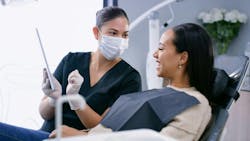The American Dental Hygienists’ Association’s bold push for professional autonomy
What professional autonomy is and is not
Professional autonomy in the dental hygiene profession means having control over our own education, practice, and regulation. It empowers us to define our profession rather than be defined by others. For far too long, external oversite by another profession has limited our ability to fully serve the public and advance the scope of oral health care.
While independent practice is one aspect of autonomy, the concept extends far beyond that. It means dental hygienists are no longer restricted to working for dentists but rather with them, and beyond traditional settings, to deliver care where it’s most needed. True autonomy bridges the gap between oral and systemic health, enabling seamless medical-dental integration, especially in areas where dentists are not present. Now is the time for self-directed change, with dental hygienists leading the way in expanding access to care and elevating our profession.
The role of autonomy in medical-dental integration
Pursuing professional autonomy for dental hygienists is essential for advancing interprofessional practice, addressing workforce issues, and improving access to care. When dental hygienists can independently assess and manage oral health, they become vital players in early disease detection and prevention. Full professional autonomy can also empower hygienists to provide person-centered care by positioning dental hygienists as the prevention specialists we are.
Expanding our professional scope and integrating dental hygienists into medical settings, such as primary care offices, hospitals, and wellness centers, fosters a more collaborative approach to patient care. This provides opportunities for dental hygienists to work alongside a broad range of medical and dental practitioners, addressing both oral and overall health. Integrated care ultimately benefits patients and the communities we serve and improves opportunities for the dental hygiene practitioner.
Medical-dental integration can include services such as nutrition counseling, salivary diagnostics, vaccinations, lactation consulting, myofunctional therapy, diabetes education and management, airway assessments, health coaching, traditional dental services, and minimally invasive dentistry. By removing restrictive barriers in scope of practice and practice settings, we can create a more inclusive health-care system while expanding access to essential oral and overall health care.
Empowering dental hygienists to work at the top of their scope can also help reduce burnout and address workforce challenges. Autonomy enhances job satisfaction, increases efficiency, opens new career pathways, and reinforces the role of dental hygienists as valued health-care professionals.
Autonomy is not just a professional goal—it is the foundation for achieving true medical-dental integration. The ADHA is proud to be at the forefront, leading discussions and shaping policies that advance the dental hygiene profession.
Education: Preparing the next generation of dental hygienists
Achieving professional autonomy requires a strong educational foundation that prepares dental hygienists for expanded roles in health-care delivery, leadership, and interprofessional collaboration. As oral health and medicine continue to evolve, our educational models must evolve too, ensuring future dental hygienists are prepared to practice at the highest level of their training.
Key advancements in dental hygiene education include:
- Enhanced curriculum: Incorporating systemic disease management, pharmacology, airway health, and digital dentistry into dental hygiene training programs to align with modern health care needs.
- Interprofessional education (IPE): Strengthening collaboration with medical, nursing, and allied health professionals to integrate oral health into overall health-care training.
- Advanced degrees and specializations: Encouraging advanced entry-level programs in dental hygiene to support leadership roles in education, research, advocacy, and direct patient care.
- Technology integration: Training dental hygienists in teledentistry, AI-assisted, and digital health records to improve accessibility and efficiency in patient care.
- Autonomous practice preparation: Equipping graduates with the clinical, business, and regulatory knowledge needed to operate independent practices, work in alternative settings, and expand access to care.
The path forward
Investing in education reform is essential to empowering the next generation of dental hygienists to lead the profession forward. By modernizing curricula, embracing new health-care models, and fostering lifelong learning, we can ensure that dental hygienists are prepared to drive change, expand access to care, and shape the future of health care.
We recently expanded on these critical topics in a webinar panel where we explored the legal frameworks, patient outcomes, interdisciplinary collaboration, and educational pathways essential for achieving professional autonomy. In this discussion, “Empowering independence: A journey to professional autonomy,” we provided practical strategies and actionable steps for dental hygienists who are ready to embrace their role in transforming health-care delivery. You can access the recording here.
The future of dental hygiene is in our hands. Through education and autonomy, we can build a profession that is fully integrated, self-governing, and positioned as a vital component of whole-body health. As leaders in ADHA, we invite you to join us in our pursuit of full professional autonomy for dental hygienists. Together, we can drive change, break barriers, and create a future where dental hygiene is recognized as an essential pillar of health care.
About the Author

Erin Haley-Hitz, MS, BSDH, RDH, FADHA, MAADH
Erin is a licensed, practicing hygienist with more than 28 years of experience from Lincoln, Nebraska. She is the current president of the American Dental Hygienists’ Association (ADHA). Erin is a speaker, coach/consultant, and cofounder of Pearly White Prevention. She can be reached at [email protected].

Lancette VanGuilder, BS, RDH, PHEDH, CEAS
Lancette is an internationally recognized keynote speaker, registered lobbyist, clinician, and thought leader, known for her expertise in medical-dental integration and public health advocacy. Her passion for increasing access to care, preventing airway-related diseases, and fostering medical-dental collaboration has earned her recognition and numerous within the health-care community. As the president-elect of the ADHA, Lancette leads initiatives that promote oral and overall health through professional autonomy. Contact her at [email protected].

Jessica August, MSDH, RDH, CDA, FADHA
Jessica is vice president of the ADHA, an educator, administrator, and longtime member of the ADHA, where she’s served at the local, state, and national levels. Currently the program dean of Dental Sciences at Portland Community College, Jessica provides leadership for the dental assisting and dental hygiene programs and oversees the community-based onsite dental clinic. She previously held full-time teaching appointments at the Forsyth School of Dental Hygiene at Massachusetts College of Pharmacy and Health Sciences, Idaho State University, and Quinsigamond Community College.


